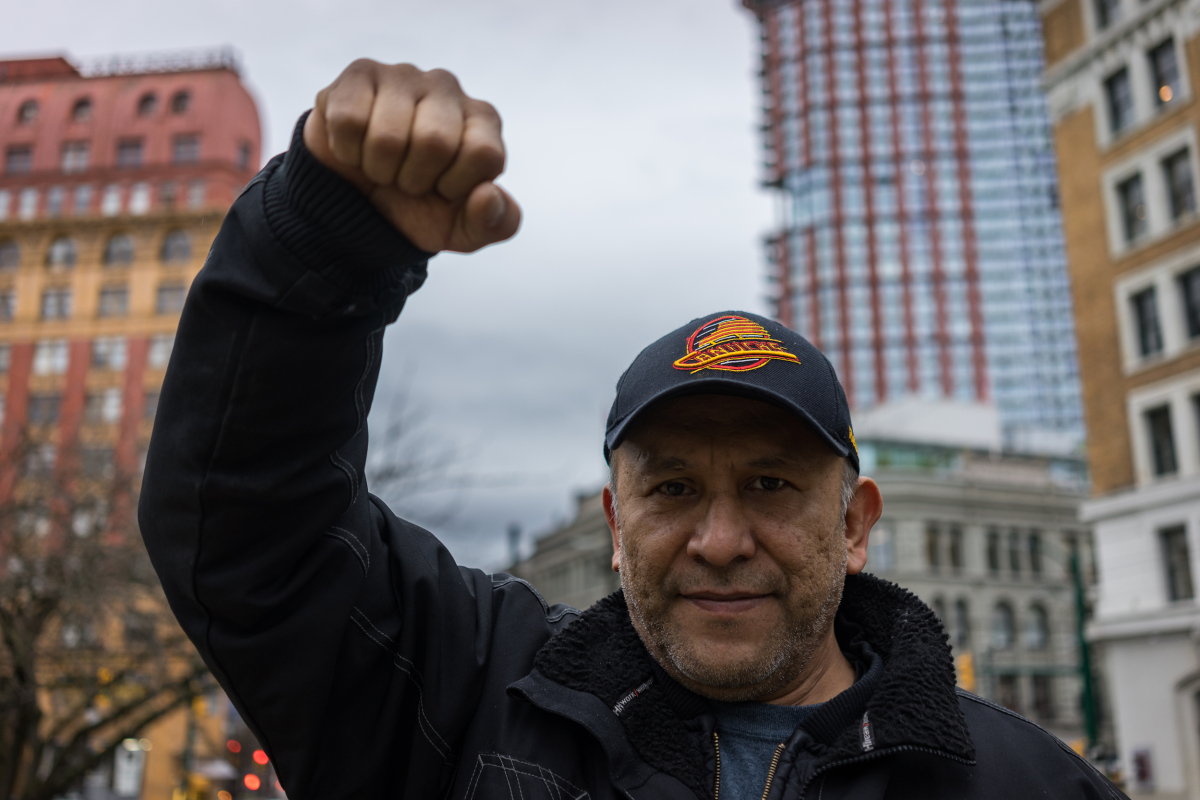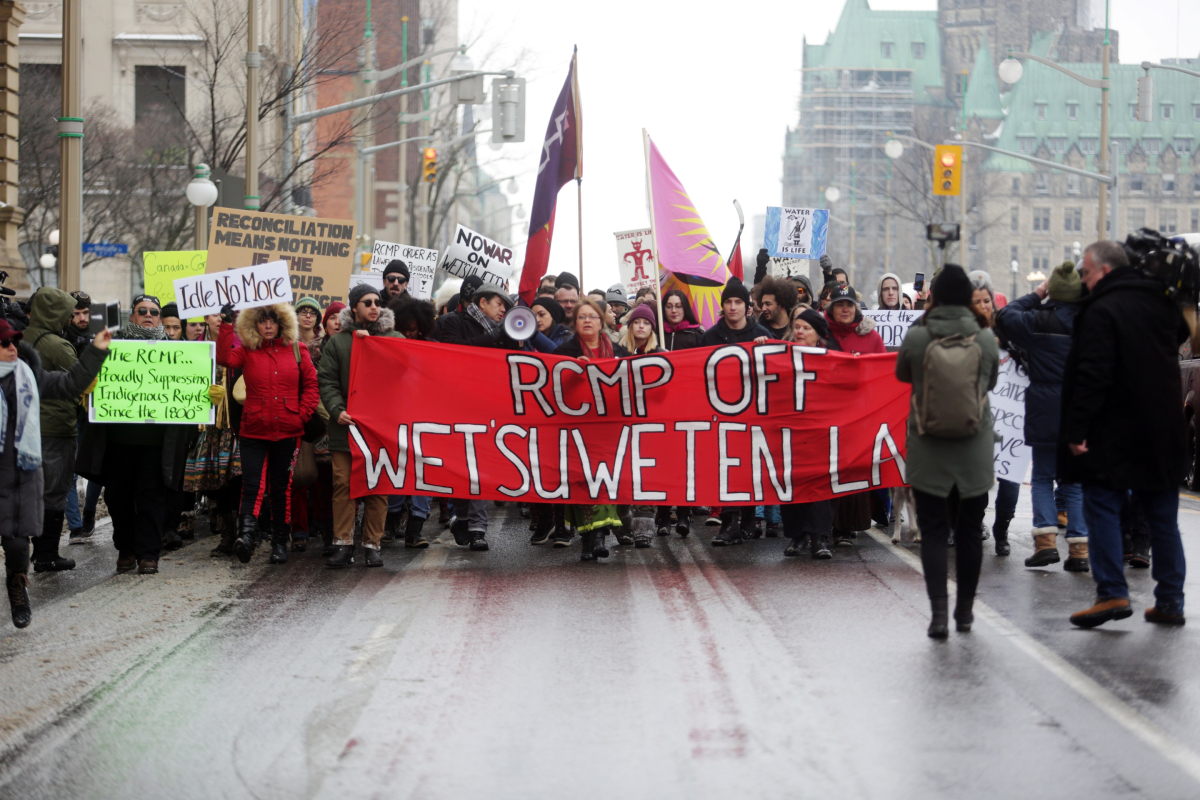Support strong Canadian climate journalism for 2025
Anger at Canada’s support for fossil fuel expansion boiled over Tuesday, driving Prime Minister Justin Trudeau to physically change venues before giving a speech to Indigenous leaders in Ottawa — where he failed to mention a blockade in British Columbia that had spurred a nationwide solidarity movement.
Trudeau was originally scheduled to give opening remarks at 2:30 p.m. at a government building at 111 Sussex Drive in Ottawa, near his official residence, where an annual forum was being held concerning treaties between First Nations and the Crown.
But he wouldn’t be able to speak until after 4 p.m. He was rerouted at the last minute to another venue across downtown, at 180 Wellington Street opposite Parliament Hill, after a long column of demonstrators charged into the venue.
The move came with little notice and resulted in a mad scramble by media to make it to the new location in time.

“Thank you all for your patience today,” Trudeau eventually told the crowd that had been reassembled at the Wellington building, for the Canada—Modern Treaty and Self-Governing First Nations Forum. He thanked those around the table for the “incredible hard work” they have done in their communities.
“Today we have a chance to reflect on what we’ve accomplished,” said Trudeau, and then discussed his government’s promised legislation to protect Indigenous languages, as well as other efforts to reform child and family services and promote a new fiscal relationship with Indigenous governments.
He took no questions from media before reporters were ushered out of the room, on a day that saw dozens of people march past heavy RCMP presence to express their frustration in chants, signs and cries of passion at the building on Sussex.
"There is no relationship more important to the Government of Canada than the one we have with Indigenous peoples," the prime minister said in a statement released Tuesday evening.
"We recognize that when our relationships are based on the recognition of rights, respect, co-operation, and partnership, we deliver better results for everyone—stronger communities, healthier citizens, thriving cultures, and greater economic success."
Demonstrators are against a proposed 670-kilometre Coastal GasLink Pipeline in B.C. The TransCanada subsidiary wants to carry natural gas from the Dawson Creek area to Kitimat on the west coast.
Many had become furious at the government, after the RCMP arrested over a dozen people for blocking access to the pipeline project, at the Gitdumt'en checkpoint on Morice West Forest Service Road in northern B.C.
The Mounties had also announced one day before those arrests that they were setting up an "exclusion zone" to keep members of the public and the media away from two camps that they were going to raid and dismantle, including the Gitdumt'en checkpoint.
The Mounties said they were enforcing an injunction issued by the B.C. Supreme Court, that had ordered obstructions interfering with the project to be removed. Coastal GasLink says it has signed agreements with First Nations along the pipeline route.
But the Wet’suwet’en First Nation hereditary chiefs say they never ceded or surrendered territory, and have a duty to protect their land for future generations.
In dozens of cities in Canada and the United States, demonstrations were scheduled Jan. 8 to show support for the Wet’suwet’en.
In Vancouver, Green Party Leader Elizabeth May, who was arrested in March 2018 at the worksite for the Trans Mountain pipeline expansion project, told National Observer she was concerned by the RCMP's actions, calling it a "clear violation" of the United Nations Declarations of the Rights of Indigenous Peoples.
She said while the Mounties were respectful and were just doing their job, "what happens in injunction cases like this, and I think Canadians need to look at this, is that our public safety and security personnel, are essentially privatized in the interest of whatever corporation got the injunction."
"The fact is that the public resources of any jurisdiction are put at the disposal of private corporate interests, and that is disturbing for me," said May.

In the context of climate change, May said continuing to develop fossil fuels in Canada was not in the nation's economic interest. But she said the issue was further complicated by the fact that elected band councils had approved the pipeline, despite the objections of hereditary chiefs.
"The Indian Act is a colonial vestige, it’s a racist piece of legislation," she said. "That’s what this conflict is about, Reconciliation."
Dennis Kale, who attended the Vancouver demonstration and identified as Wet’suwet’en living in Vancouver, said he was "very sad for the society that we live in today."
"My people are hurting, it makes me hurt. Our land is hurting. We’re in a fight that I’m afraid that we won’t be able to win," he said.
"Unless there is a large movement, an international movement on oil, there is not going to be any Reconciliation. My people are hurting and it makes me hurt. It makes me hurt and it makes me emotional that I can look at a situation and I can’t fix it myself. I can’t just go over there and take it apart and put it back together."

Back in Ottawa, the gathering that occurred first on Parliament Hill, and then headed down Wellington Street to Sussex Drive toward the venue that was to host the prime minister, held a large red banner reading "RCMP off Wet’suwet’en Land."
People in the crowd hoisted signs reading “water is life” and “Reconciliation means nothing if the behaviour doesn’t change.”
At the building on Sussex, they staged a die-in and heard from speakers in the crowd who used megaphones.
“I am tired of the lies. I look at the elders, and their eyes are tired for a reason,” said one speaker to the crowd. “We can’t keep doing this. You either respect us or you don’t, and there is no fine line...you cannot rape the land, and then tell us that you're going to pass a bill to say that you love us and you respect us.”

At the Wellington building, after Trudeau, reporters were permitted to hear from President Eva Clayton of the Nisga'a Lisims government on the West Coast, and then from Chief Jennifer Bone of Sioux Valley Dakota Nation in Manitoba.
Indigenous Services Minister Jane Philpott, Crown-Indigenous Relations Minister Carolyn Bennett and Environment and Climate Change Minister Catherine McKenna were also present at the roundtable, but did not speak before media were ushered out.
Clayton said it was her privilege to be at the forum and address Trudeau — then said it was unfortunate that the government’s "distinctions-based" approach — meaning that specific responses are required for First Nations, Metis or Inuit — is only “useful if the Crown gets the distinction right.” She said she hoped more progress would take place.
with files from Michael Ruffolo






Comments
Ottawa/BC has a Tiger by the tail. I wish First Nation People every success. Our environment should not be trumped by commerce.